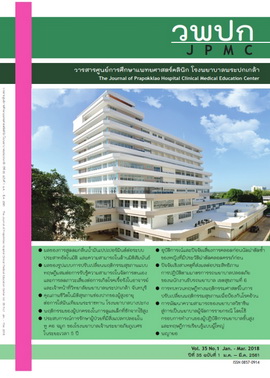Unplanned Deliveries before Elective Repeat Cesarean Section: Incidence and Risk Factors
Main Article Content
Abstract
Background: Unplanned deliveries before elective repeat cesarean section (ERCS) were common obstetric problems associated with both maternal and neonatal morbidities.
Objective: To study the incidence and risk factors related to unplanned deliveries in pregnant women with a schedule of elective repeat cesarean section (ERCS)
Materials and Methods: Six hundred and one pregnant women with a schedule of ERCS at Prapokklao Hospital from January 1st, 2014 to March 31st, 2016 were recruited. Incidence of unplanned deliveries was investigated. Demographic and obstetric characteristics were compared between unplanned and scheduled delivery group. Proportion difference and relative risk were analyzed by using chi-square test and generalized linear model.
Results: Incidence of unplanned deliveries was 52.9 %. Pregnant women with parity ≥2, the number of prior cesarean sections ≥2, history of preterm birth, history of fetal low birth weight, the number of antenatal care visits <4 or pregnancy-associated hypertension experienced more unplanned deliveries significantly. Pregnant women with the number of antenatal care visits <4 had 1.7 times more risk of unplanned deliveries (95 % CI 1.04-2.80, p=0.035), whereas women with history of preterm birth had 1.5 times more risk (95% CI 0.87-2.69, p=0.144).
Conclusions: Unplanned deliveries in pregnant women scheduled for ERCS beyond 39 weeks of gestation occurred about a half. By using multivariate analysis, the number of antenatal care visits <4 was considered to be a prognostic factor related to unplanned deliveries.

